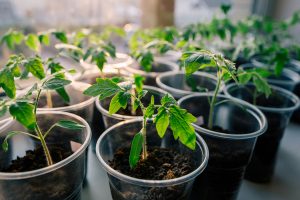As the weather warms, looking ahead to gardening in the weeks and months ahead can be a favorite past-time. Are there any special precautions that we need to take when growing fruits and vegetables this spring and summer because of the COVID-19 pandemic? Experts actually recommend preparing the garden and starting seedlings indoors as great activities for individuals and families while adhering to the ‘Safer at Home’ regulations.
And while experts tell us that there isn’t any evidence that the coronavirus survives for any length of time in the environment and they also don’t believe that COVID-19 is a foodborne disease, there are some very real foodborne illness issues related to growing, harvesting, and handling of fresh produce. Luckily, simple food safety practices are always in season when growing fresh produce:
- Locate your garden in well-drained soil that is free from heavy metals like lead and mercury.
- If you use animal-based fertilizer, make sure it is well composted.
- Keep animals, including pets and wildlife, out of the garden. This can be easier said than done, but animals can carry diseases. Do you best to keep them out of the garden. Use fences, noisemakers, or predator decoys in your efforts to keep them out. Do not harvest produce that animals have contaminated.
- Know where your water is coming from. If your water is from a well, make sure that the well is tested yearly. City water is fine to use in a garden. Use only potable (drinkable) water for rinsing harvested produce.
- Keep garden tools clean and periodically sanitize them to keep tools from spreading human or plant diseases. To properly sanitize equipment like nippers or hand shovels, wash tools in soap and water, rinse with clean water, and dip into a sanitizing solution. Allow to air dry. A good sanitizing solution is ¼ t. concentrated bleach (8.25% hypochlorite) per quart or 1 tsp. per gallon of clean water.
- Wash Your Hands! Handwashing is the best way to prevent the spread of germs. Wash your hands before you enter the garden and as you leave. Wash your hands for 20 seconds with soap and water and dry them thoroughly. Wash your hands before harvesting, after handling compost, plant debris, or garbage, after touching animals, and after using the bathroom.
- Be well. Do not work in the garden or harvest if you have been sick.
- Harvest for quality. Fresh fruits and vegetables that are of high quality will resist decay and the growth of harmful organisms. Harvesting for quality generally means early in the day before the sun is out in full force. Safe produce handling guidelines can be found here.
For those who may be donating a portion of their garden bounty to food banks or food pantries (or working with individuals who are), the Division of Extension has developed materials to help support fruit and vegetable safety: Make Your Donation Count (training for gardeners) and Keep It Fresh & Healthy (training for food pantry workers). Both can be found here: https://safeproduce4foodpantries.org.
Good gardening practices and fresh produce safety are always ‘in season’. Stay well and food-safe.
